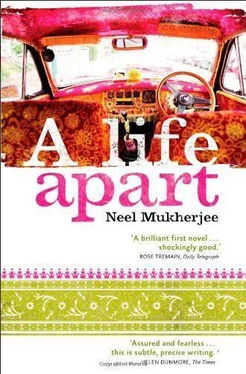Truth was, there was no effort on his uncles’ part to make things better. They just grew a thicker hide. They knew they had it good: sleeping in till mid-day, having food waiting for them (when it was there), no rent to pay, no bills to think about. They knew if they left it long enough, a crisis would develop and their brother-in-law would have to do something about it, so they left it to him. The confrontations, unhappiness, the dividing lines that were slowly developing — all these seemed to them a small price to pay for the larger pleasures of laziness and living off someone else.
And if there were occasions when they did not have food waiting for them, they could always take it out on their mother. The whole family was a twisted version of some domino effect. They were all linked by their use of each other as channels of anger and resentment; a pressure on one point in this chain would invariably lead to effects all along the line. So Ritwik’s father shouted at his wife; Ritwik’s mother screamed and beat up her sons; his uncles either went underground or, when a showdown became inevitable, braved it out and then took out their humiliation on their paralysed mother.
Any excuse would do. Shirt was a recurring one. Pratik had one decent shirt that he hid zealously away from his brothers. Every time one of his brothers felt the need to wear something special, something other than the one frayed shirt and one pair of trousers each of them had, he stole Pratik’s fancy shirt. He either found out the hiding place by coercing his mother or, if she refused to tell, ransacked the whole house till he found it. By some malign law of probability, the shirt would go missing the very evening Pratik wanted to wear it himself. When he found out it had been stolen, his first target was his mother.
‘You must have told Pradip. Only you knew where it was kept,’ he shouted. (That was another thing: nobody spoke in that house, everyone shouted. Everything was done slightly awry to the civilized norm.)
‘No, I didn’t. I didn’t know where you hid it,’ Dida muttered.
‘You did. You saw me putting it away under the mattress,’ Pratik challenged.
Dida was scared now. ‘Nn. . o. .’ She started limping away.
Pratik saw that chink and pounced. Literally. He clutched her hair, pushed her against the wall and started banging her head against it. ‘You did, you did. What am I going to wear tonight then?’ he kept on shouting.
Ritwik’s mother rushed in and separated them. She shouted back at her brother, ‘How dare you do this to your own mother? You’re an animal, an animal.’ It petered out, aware of its own futility.
Pratik simmered till Pradip returned very late at night, hoping Pratik would be asleep so that he could slip the shirt back in under the mattress. No such luck: Pratik was waiting in the dark like a crouching feline.
Another fight broke out. The sound of two men fighting in a confined space in a tiny flat was like a little earthquake of thuds and crashes; it woke up everyone, even some of the neighbours. In the room where Ritwik and Aritra and his parents slept everyone started stirring. Ritwik’s father did not miss this chance of delivering another blow to his wife. ‘There, the dogs are at it again. There’s no bloody peace in this house.’ He made as if to get up and intervene but she stopped him.
‘Why do you want to get involved if you hate them so much? Let them tear themselves to pieces, what do you care?’ Her voice was like a spring coiled to the point of breakage.
‘It’s because of my sons. How can you bring up children in this hell? What do you think they’re going to pick up from this?’ he replied. The boys were wide awake now but they pretended to be asleep; at least they could spare their parents one added concern. Not only was Ritwik’s heart knocking painfully against his chest again, there was also something new — a rising and falling column of sharp fire from behind his chestbone up to his throat, then down and then up again. He knew Aritra was awake because his breathing had gone very quiet and measured.
‘Why did you come here then? How many times did I tell you, before we moved, don’t give up the flat in Park Circus, don’t give up the flat in Park Circus. Why didn’t you listen to me?’ Her words were a jet of acid hiss against glass: they were both trying not to wake up their children.
It was his father’s turn to remain silent now, a guilty silence in that pitch dark room, as if she had exposed his complicity in the whole business and he had no reasonable defence with which to counter her accusation.
There was a loud crash followed by a thud in the other room. As one by one the neighbours’ lights came on, Dida tried to intervene in the fight taking place right under her nose. She mumbled, ‘What will the neighbours think?’
This was all the excuse the brothers needed. It was Pradip’s turn to have a go at his mother. Like a feral dog, he turned his attention on her, crouching low beside the bed on which she lay. ‘What did you say about the neighbours? What did you say?’ he shouted.
She was too scared to answer. This just stoked the fire. He started slapping her face — one, two, three, four, the sound of skin on skin a neat sharp crack each time. ‘You told him I wore his shirt. You’re behind this.’ She couldn’t even move away from this assault: it took her a long time to shift her body from one side to another.
Pradip continued shouting, ‘You’re the bitch behind all this. That’s what you do all day — carry tales from one camp to another, play people off against each other. You’ve nothing else to do all day, you sit in your chair and gossip.’
She was crying now, her mouth a helpless rictus of pain, but no sound escaped from her, not even a sob; it was as if she was trying to erase any sign of life that marked her out as another human being, to reduce herself to an inanimate object, so that her sons could ignore her and vent their fury on something else. At that point, Ritwik’s mother entered the room.
‘Aren’t you ashamed of yourselves?’ she said. Her voice was between a shout and a threat. ‘What will everyone think?’ The brothers loped away like chided dogs with their tails between their legs. It had happened before, it would happen again. Sometimes she tried to scare her brothers by reminding them that violence towards their own mother was one of the greatest sins possible. It was as bad as killing a cow; it would call down certain vengeance from the gods. Surely the gods had already cursed them for such unnatural behaviour: the squalor, the unhappiness, the menace, weren’t all these really just effects of their displeasure with the family? This only had a loose hold on her brothers’ minds for it came undone, readily and with slick, perfect ease, at the next flashpoint.
And so it went on.
Ritwik never understood what his father did for a living but felt instead a growing anxiety at its irregularity and meagreness. A broker, maybe? An in-between man in deals? A facilitator? As a young boy, when he had asked his father his profession, possibly because he had been set the standard school homework of writing five sentences on ‘My Father’, the answer had been, ‘Engineer’. That had stuck for a very long time, along with other things whose residue he has started to scrape off slowly only now. It had acquired the status of truth. Even to this date, the ‘father-as-engineer’ picture stole in microseconds before the certainty of its untruth.
So what did he do? He really didn’t know and not having been very close to his father, especially in those abrasive late teenage years, he hadn’t made much of an effort to find out. It was partly to save both of them the embarrassment of having to address an issue which demanded fixed, stable answers in accordance with the fixed, stable structure given to parent-child relations. How would his father have faced up to an answer that was fuzzy, for he really did not have a profession category in which he could slot himself? How would Ritwik have taken such an answer, or shored up against his own uncertainties of childhood the flotsam of an old man’s shame and insecurities?
Читать дальше












